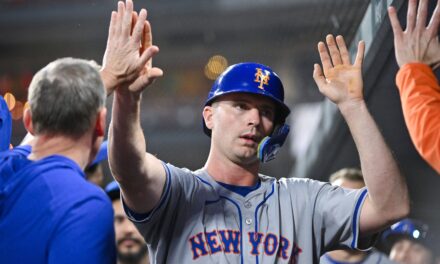
Photo by Ed Delany of MMO
On May 15, the New York Mets lost a tough game to the Seattle Mariners, giving them their first series loss of the 2022 season. The Mets had the lead, lost the lead, then battled back furiously in the bottom of the ninth inning, only to fall short by a run.
Some of the fan reactions after the game indicated a fear that 2021 was happening all over again, a good start followed by a demise. After all the Mariners had lost 12 of 15 when they arrived in Queens, so this has to be the beginning of the end. Not only is it too early for such comparisons, the 2022 version of the Mets seems to have an intangible that their previous-year predecessors did not have, an intangible that may mitigate long, season-damaging funks. That intangible is a strong and positive team culture.
What is Team Culture, and Is It Even Important?
After all, we have heard the (somewhat apocryphal) stories of the Oakland Athletics of the early 1970s-they took 25 separate cabs to the ballpark, but they won three consecutive titles. Organizational culture, is defined as follows in the Harvard Business Review:
“Organizational culture defines a jointly shared description of an organization from within.” — Bruce Perron
How do we know the Mets have a good organizational culture? Let’s look at some examples from within. Here is Travis Jankowski from Anthony DiComo on MLB.com.
“This team, dude,” Jankowski said, shaking his head. “I’ve never been a part of a team where the people in this clubhouse genuinely care about the person. It’s a really cool vibe in here.”
Jankowski’s comments came in response to the team wearing jerseys with the number 16 on them after Jankowski characterized himself as a role player and “no one will go buy my jersey.”
Pitcher Chris Bassitt also seems to think the Mets have a created something positive. From Joel Sherman in The New York Post:
“Yeah,” Bassitt said when asked if he would be open to extension talks. “From my standpoint, I am very surprised at how much I like it here, to be honest.”
In listing what he has appreciated about his Mets experience to date, Bassitt cited general manager Billy Eppler, manager Buck Showalter, the tenor of the clubhouse and being pushed physically, mentally and competitively by Scherzer.

These examples (and the simple “eye test”) would seem to indicate that the Mets have developed a solid culture. But, back to the question above, how much does culture matter? In the business world, the experts would say it matters quite a bit. From The Alternative Board:
There is a famous Peter Drucker quote that says that “culture eats strategy for breakfast.” This implies that the culture of your company always determines success regardless of how effective your strategy may be.
When he said that culture eats strategy for breakfast, Drucker pointed out the importance of the human factor in any company.
As written here on MMO, the Mets are being run more like a business. They have taken steps to bring in top-level talent in analytics and human resources from owner Steve Cohen’s hedge fund. Perhaps the most important element the Mets have brought in, tying all of this together, is leadership. That leadership comes in the form of some of the new players (such as Max Scherzer), and certainly from the manager Buck Showalter.
When Showalter was hired, some expressed concerns that he was not as up-to-date on some of the analytics as a manager needs to be. However, the Mets have, as noted above, expertise in that critical area. They did not need their manager to be a subject matter expert in analytics, rather, they needed a leader to help create a culture conducive to winning. From SHRM:
A strong culture is a common denominator among the most successful companies. All have consensus at the top regarding cultural priorities, and those values focus not on individuals but on the organization and its goals. Leaders in successful companies live their cultures every day and go out of their way to communicate their cultural identities to employees as well as prospective new hires.
The same applies to baseball teams. Showalter seems to have gotten everyone on the same page, the page that talks about the team first (such as Jeff McNeil going the other way for hits), and the “next man up” mentality.
In 2021, we saw the rat/raccoon incident, and the thumbs down fiasco (where the apology was worse than the issue, when Francisco Lindor and Javier Báez faced the cameras, though they were not the only participants). It’s hard to imagine that type of thing happening on the 2022 Mets, because it would not be consistent with the team’s culture.
What Does All of This Mean?
In summary, a good culture is important in business and in baseball. Leadership (players, coaches, and front office) helps create that culture. The Mets appear to have the necessary leadership and culture to make their winning ways sustainable.
Winning is, of course, multi-factorial. Talented players (who can remain on the field) are tantamount to success. The value of culture, however, cannot be underestimated. The Mets seemingly have brought in people to create the type of culture in which a baseball team can thrive.














